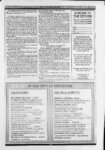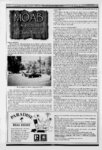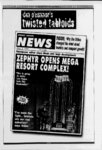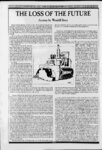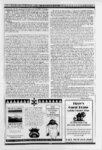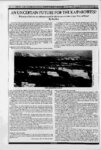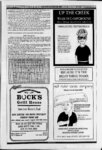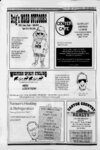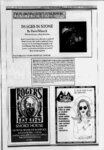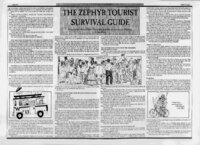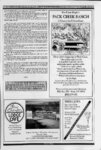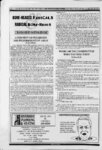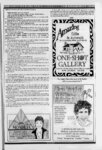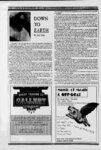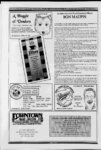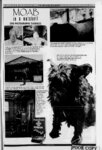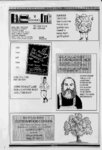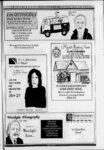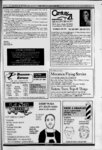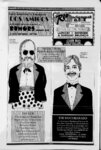| OCR Text |
Show This is the Letter of the Month. Dear Jim, You might not remember me, but I talked to you in the spring of 1994 as I was writing my senior thesis on the impacts of commercial activity on the town of Moab. When I returned this April I found a lot had changed; The Allas uranium refinery was gone, the tailings pile remained, a new water park(???) was built, new shops, new bikes hung on new RV's on the newly paved restaurants, new titanium-wondslkkrock trail parking lot, and I had the sad realization that none of it surprised me. I came to Moab as a mountain biker intent on making the pilgrimage to the slickrock trail and the other routes that make up the Mecca of fat tire chic. Moab had for me always been a place to stop for gas on my way to more remote regions where I could experience the solitude and striking beauty of Southern Utah's landscape. Anyway, I rode the trails, camped along the Colorado River and in the end decided that Moab was fun, but curiously empty. Riding the slickrock trail is more a novelty than a great experience: While you concentrate on the patch of sandstone directly in front of you, you ignore the surrounding splendor until words painted on the trail tell you to look up momentarily from your furious shifting and pedaling before passing on to more feats you can tell your friends about. While I was camped along the Colorado River, a boat came down the river escorted by some diesel monster on the road equipped with ridiculously powerful lights so the canyon walls could be lighted as the boat blared its narrative of Southern Utah's history in poorly acted baritones. Hmmm. Something was amiss. When I left I resolved never to return (In this I know I am lying to myself) as Moab was developing into an example of what happens when we love an area to death. It seemed as if my presence along with thousands of other lycra-da- d idiots just like me was destroying the thing I had come to worship. I can't justify a week of "fun" at the expense of a land already pushed to the brink. I was responsible, I used the new shitters up at Sand Flats (VERY nice!) I packed all my trash out, etc., etc. Yet the progression marched on, the jeepers motored along, the RV's lumbered about, the bikers flew by on folly suspended metallurgical wonders, I improved my bike handling skills and rode past too many cool places without even noticing. On my last night I went up to Delicate Arch and stayed until nightfall. I heard one woman say "Wow, with all the people gone, Delicate Arch can just be itself again." Yes, I certainly hope so. When we are all silenced, the subtler progressions of erosion and evolution will erase our traces, our scratching on the rocks of Southern Utah. So am I to return knowing that in the end it probably won't really make that much diffiercnce whether one more set of tires rolls down the Porcupine Rim trail? Or do I leave Moab to the tourists and contribute to its economy by stopping for gas on my way to some unknown sector of Southern Utah where I will not be followed by hoards of others? Soon everything will be paved and air conditioned; shaded conveyor tubes will transport us to all the beautiful photo opportunities, more people will come, Moab will bustle with economic prosperity, the river tours will probably go digital and add a few thousand watts to their woofers and the canyons will echo with spectacle. More bikes, more RV's, more jeeps, more people looking for fun. Perhaps it is a sense of imminent loss that drives us. A sense that we already know what is happening to our lands and that this may be our last chance to say, "Yes, I was there." er t Robin Ley V Caldwell, ID Dear Jim I like the bom again Zephyr. I especially like your making the population crisis a theme. However, although controlling overpopulation is critical in maintaining the planet's health, I think it's only a magnifying factor in all the social and environmental ills you mentioned. It multiplies the effects of any problem. Reducing the population reduces the magnitude of the effects but docs little or nothing to eliminate the cause of the problem. In your column, you devote a lot of space to all the stuff that people NEEDLES OUTPOST CANYONLANDS N.P NEEDLES DISTRICT Located 34 miles west of Hwy. 191 on Route 211 CAMPING SHOWERS GASPROPANE 4x4 RENTALS SCENIC FLIGHTS MAPS BOOKS INFORMATION SHOWERS GENERAL STORESNACK BAR ICE. COLD BEER POP FIREWOOD CALL 979-400- 7 or deficit-financin- g, short-sight- self-inter- ed est Regards, Mary Ann Short Ojai, CA Note: YJhether population is a cause of social problems or whether it merdy enhances them is a debate for another time. But certainly, trying to salve those problems in a U.S. of 160 million (1950 pop.) vs. 500 million (projected for the end of the next century) is the difference between trying to swim to the water's surface from the bottom of a six foot pool or from the wreck of the Titanic...JS. Editor, Dammit; Jim, I just wrote a brilliant letter questioning just how it is you can survive with 2 out of every 3 customers stiffing you. Then you go ahead and just give the damn thing away. What kind of American are you? We are here on this planet to acquire as much material stuff as we possibly can before blastoff. And here you go giving it away. "Well hell, if they won't pay. I'll just let em have it." Man oh man. I'll have to start reading the Wall Street Journal or People magazine to get back in step with the rest of America. I guess it says something about your readers, 66 of them being crooks. Oopps, I'm one of them. At least I'm in that wonderful 33 group that pays. Then again I ' guess I have no choice; being from New Mexico. ' Sincerely, Jeff Lunt . Albuquerque, NM Jim, I read your treatise on population explosion; it was great, I have never read such clear insight; I really mean that. RATS IN A BOX... we are finding ourselves growing exponentially and bulging at the seams, we grow somewhat insane coping with the pace generated by, say, five thousand stressed out vacationers driving over everything with their 4x4's sneering through their OAKLEYS at the dead wolf in the middle of the freeway (I guess the wolf found a hole in the cattle fence; eh?). So anyway, Jim, before I rant like a R.I.A.B., let me get to a point. The point is, there is a way to control the destiny of your population center. There is only one tool available to stun the awful - terrorizingKmuch better word than 'terrifying' don't you think?) - crushing tide of greed. No one can stop the fact that a parcel of unspoiled Moab land that sells for $100,000 today will be worth $700,000 very soon. Admit it, that curve will not change your land (v our land, Jim) will continue to soar in value. All of you land owners will become richer. Talk about population growth all you want; economic growth results as sure as rain evaporates from a rock in the sun. People who can afford it seek spirituality - what they find sometimes is and -- So Hillary Rodham and I went out for a Big Mac & Fries and then we heard that the Needles Outpost had the best burger & fries in Southeast Utah. So we flew Air Force One down here and by golly it was well worth the enormous expense to you the taxpayer. Thanks. 259-854- 5 - want, buy, and make. People want all that stuff because it's a sign of "progress" or "growth" to have it. In today's terms, progress and growth mean more and bigger, not a progression to something better or a growth in quality. To help change the generally accepted connotation of growth and progress and help people understand the true costs of their current meanings, the economic paradigm must reflect reality. The price of all that stuff people buy must internalize the costs of environmental damage. In other words, an item's price should include all the resources that are used to manufacture that item and the consequences of using those resources, in particular, the resulting air and water pollution, reduction in biological diversity, and problems of disposal when people throw the stuff out And don't forget the social costs. Although the numbers indicate that the standard of living in the U.S. is improving, there aren't many individuals who would say their own standard of living is improving. The problem is even more severe in other parts of the world. HILARY French, in Costly tradeoffs: Reconciling Trade and the Environment (Worldwatch Paper 113, March 1993), says, "Though economic growth in recent decades has enriched many, there are hundreds of millions for whom living conditions have deteriorated rather than improved. To the extent that world trade has or to worsening income inequality, it has contributed to ecological failed to promote a secure economic future. Probably the single most important reform needed to place work! trade on a more sustainable footing is widespread internalization of environmental costs through tax policy and other measures." Money makes the world go round. Without the proper controls in place;, our could drastically alter the world as we know it. n - am iTHIRIYrEIGHT POOR |


